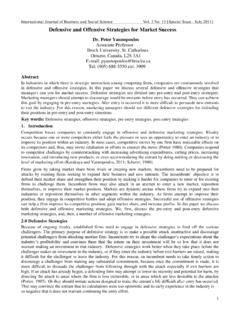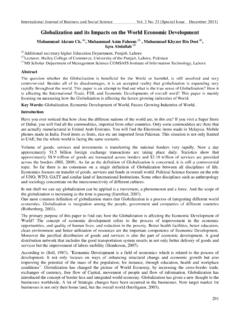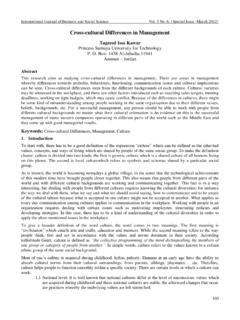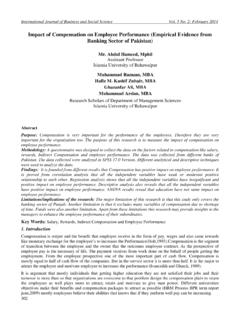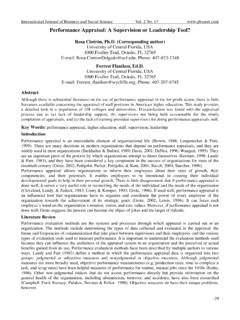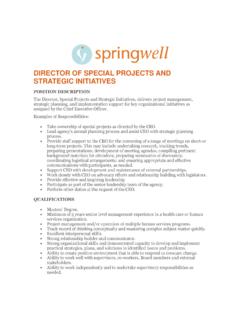Transcription of Strategic Role of Leadership in Strategy Implementation in ...
1 International Journal of Business and Social Science Vol. 3 No. 16 [ special Issue August 2012] 271 Strategic Role of Leadership in Strategy Implementation in Zimbabwe's State Owned Enterprises Denver Mapetere Lecturer Department of Business Management Faculty of Commerce, Midlands State University Senga Rd Gweru, Zimbabwe Severino Mavhiki Lecturer Department of Business Management Faculty of Commerce, Midlands State University Senga Rd Gweru, Zimbabwe Tonderai Nyamwanza Chairperson Department of Entrepreneurship Faculty of Commerce, Midlands State University Senga Rd Gweru, Zimbabwe Shingirai Sikomwe Lecturer Department of Business Management Faculty of Commerce, Midlands State University Senga Rd Gweru, Zimbabwe Christopher Mhonde Lecturer Department of Business Management Faculty of Commerce, Midlands State University Senga Rd Gweru, Zimbabwe Abstract The study aimed to explore the link between active Leadership involvement and Strategy Implementation success in State Owned Enterprises in Zimbabwe.
2 The study was conducted between July and October 2010 with a total of 188 respondents randomly selected from four State Owned Enterprises. The data was gathered through an interview and a self-administered open ended questionnaire. The study revealed a relatively low Leadership involvement in Strategy Implementation leading to partial Strategy success. Leadership has been failing to role model the ideal behaviour necessary for successful Strategy Implementation . The absence of a well crafted Strategic vision and the lack of communication were also identified. The study concluded that Leadership should be able to craft a vision for any Strategic programme, design effective communication strategies as well as to role model behaviour changes that are consistent with new strategies. Key terms: Strategy , Strategy Implementation , Leadership , change management Introduction Leaders in all organisations are aware of the need to strategically plan the future of their organisations as well as to partake in the effective Implementation of these crafted strategies.
3 The special Issue on Contemporary Research in Arts and Social Science Centre for Promoting Ideas, USA 272 A leader is viewed in this study as a managerial employee who is tasked to oversee the successful execution of Strategic initiatives. While issues of Strategic planning have presented challenges to Strategic leaders, it is in the area of Strategy Implementation where these leaders have encountered a number of challenges. Hrebiniak (2006) reported that although formulating a consistent Strategy and making it work is fairly easy, implementing it throughout the organisation is even more difficult. Allio (2005) also concluded from an economist survey of 276 senior operating executives that a discouraging 57% of firms were unsuccessful at executing Strategic initiatives. Strategy Implementation is an area that is now highly valued by entities. The ever-rising fiscal burden of the Zimbabwe Government has raised expectations on State Owned Enterprises Strategy Implementation so that they turnaround their fortunes and be self funded.
4 Strategy Implementation which refers to the process that turns plans into action assignments and ensures that such assignments are executed in a manner that accomplishes the plan's stated objectives, is the hallmark of effective Leadership . Strategy Implementation is only successful when it is backed by effective Leadership . This study explored the importance of effective Leadership in the success of Strategy Implementation amongst State Owned Enterprises Zimbabwe. Literature review The concept of Strategy Implementation in State owned Enterprises Several studies have been conducted on issues pertaining to challenges faced by organizations during Strategy Implementation . However, a search of the literature shows that little or minimal attention has been given to the Strategic role of Leadership in the Strategic Implementation process in State Owned Enterprises with regards to Zimbabwe.
5 Studies carried out on Leadership involvement in Strategic Involvement reveal that leaders need it: have different Leadership behaviors for different change events (Fielder 1967; House 1971; Tannebaum and Schmidt 1973); show the competence to craft vision and set goals (Bennis 1987; cited in Thach et al 2007); understand and know how to use power (Hardy 1996); devise more efficient ways to present change to employees (Larkin and Larkin 1996); apply their technical, human and conceptual skills (OECD, 2002 cited in Svetlik, 2005). Fielder (1967), House (1971); Tannenbaum and Schmidt (1973) studied Leadership behaviour and they found out that leaders should have situational Leadership style behaviors for different change events. In other words, different Strategic changes will be effective with the appropriate Leadership style. In this regard the Leadership behaviors that will support a change initiative in the longer term are those that inspire, stimulate, or instill a sense of purpose within the employees.
6 The shaping of behaviour aligned to Strategy Implementation programmes can therefore be an effective Strategy to improve Strategy Implementation success. Bennis (1987; cited in Thach et al 2007) carried out a study on Leadership competencies argues that amongst the competency clusters, leaders should be able to craft a Strategic vision and set goals. Mackenzie et al (2001) also postulated that effective leaders implement change through articulating a vision, fostering acceptance of group goals, providing individualised support and intellectual stimulation and clarifying performance expectations. A research by Larkin and Larkin (1996) concluded that leaders should find more precise and efficient ways to present change to employees and be able to describe the appropriate communication channels to use. They also further argue that groundless rumors can undermine chances of success, so it is important to choose appropriate media and to begin to communicate at an early stage in the Strategy Implementation process to avoid misunderstandings.
7 Smith et al (1995 p 28) reported on the differences in Strategy Implementation receptivity during the communication process of a large Strategic change initiative with the State Transit Authority in Victoria. After a series of continuous discussion sessions and other site inspections, it was discovered that pen discussions gave a sense of ownership of the Strategy which results in commitment to the Strategy and a sense of enthusiasm and personal change. The absence of effective communication systems hinder the creation of new meaning and acceptance, hence Strategy implementers fail to recognize the need for change. Trinka (2004) and OECD (2002) as cited in Svetlik (2005) in their research on Leadership competencies concurred that commonly referenced competencies for successful Strategy Implementation include; integrity/honesty, communication, technical competence, diversity consciousness, developing others, results orientation, change management, interpersonal skills, problem-solving, decision making, political savvy, Strategic /visionary thinking, customer focus, business skills, team Leadership , influence skills, conflict management, emotional intelligence, social and environmental responsibility.
8 International Journal of Business and Social Science Vol. 3 No. 16 [ special Issue August 2012] 273 The failure to identify one's competence and use such or a combination thereof dampen the quality and success of Strategy Implementation programmes. A leader without power or who does not know how to use power will fail in Strategy Implementation for such a leader will not be in a position to influence individuals to perform. Hardy (1996) argues that power has a central role in Strategy Implementation and studied how the use of power can guide an organisation and its members throughout a Strategy Implementation process. Jackson and Carter (2000) presented that there are two kinds of forces in an organisation; power and authority. They identified the forces of power as being the ability to get someone to do something that he or she does not particularly want to do . However, Hardy (1996) further reasons that in order to use power it is necessary to understand what it involves before actual application on employees.
9 Methodology The study was carried out with 188 full time employees in four State Owned Enterprises in Zimbabwe. The sample comprised of 7 top managers, 14 middle level managers and 167 employees who were all present when their respective organisations instituted at least two Strategic changes. Data for the study was collected using three (3) methods after a review of the literature. The content validity of the methods used was evaluated through a pilot study with 50 employees drawn from two State Owned Enterprises in Zimbabwe. The first method entailed the use of desk research to obtain secondary data from the field of Strategy Implementation . The second method was the use of two questionnaires, QA and QB. Questionnaire A (QA) was completed by company top Leadership (managing directors, general managers, and branch managers). It provided specific details concerning Strategy Implementation role played by leaders.
10 Questionnaire B (QB) was completed by employees (full time employees present during the Implementation of at least two strategies). Through QB, data was collected which deals with organisational change readiness as an influence of Leadership involvement prior and during Strategy Implementation . There was a 72% response rate of the questionnaire. The third method was the use of personal interviews to validate questionnaire responses and to follow up on partially completed questionnaires. Interviews were done with four (4) managers from the State Owned Enterprises. Descriptive statistics was used to analyse the data yielded from the research questionnaires for selected research questions. The agree and strongly agree, disagree and strongly disagree Likert scale categories were collapsed into a single agree and disagree category responses respectively, with the responses (raw scores) being converted to percentages for comparison purposes.

